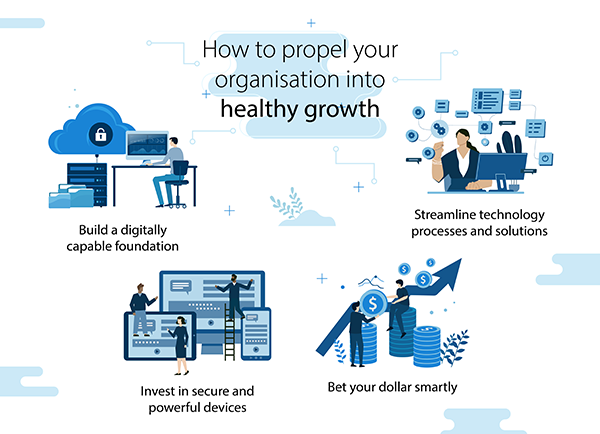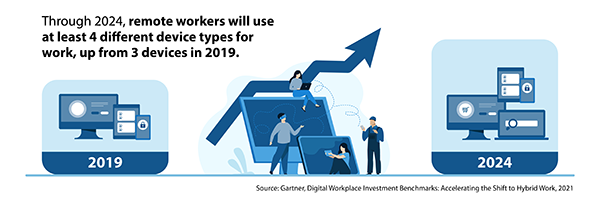The modern workforce needs radical flexibility: where businesses should invest next

Digital workforce and hybrid working are emerging as new determinants of company success. For 92% of office workers, a hybrid workplace is now preferable to traditional non-flexible forms of work. Employees now need and demand the freedom to work from anywhere they wish.
For CIOs, this means that future IT investment decisions will require a careful balance between employee satisfaction and company goals and objectives. Global IT spending forecasts provide some direction: they indicate that the future is in cloud, IT services, and devices. In particular, IT services and devices are topping out as the second and third largest markets respectively, forecasted at $1.28 trillion and $814 billion for 2022[1].
The top imperative for organizations is now to support an anytime-anywhere digital workforce. By building a digitally capable cloud foundation, streamlining technology solutions, and securing powerful devices, leaders can hope to propel their organizations past recovery and into healthy growth.

Build a robust cloud foundation
Enterprise digital transformation plans have been brought forward to 2022 as businesses respond to a new business and social dynamic. Leading the wave are cloud technologies, which are fast becoming the foundation of agile work processes, integration capabilities, and a modern, distributed workforce.
According to Gartner, the cloud market became larger than the non-cloud market for the first time in 2020, and the firm posits that it will double the size of the non-cloud market by 2025[2]. In fact, 77% of enterprises already had at least one portion of computing infrastructure in the cloud as early as 2018[3]. Driving the trend is a desire for organizations to enhance their agility and flexibility to respond to rapidly shifting market conditions, and a desire to adapt to new technologies like automation and artificial intelligence.
In line with that, Chromebooks are emerging as the laptop of choice for enterprises, with shipments up 13.5% for the full year of 2021 compared to 2020. ASUS Chrome Enterprise Devices run on Google Chrome OS instead of the usual Windows OS or Apple MacOS. All data is stored in the cloud, offering enterprise capabilities, tighter security, cost-savings, and attractive end-user benefits.
Besides transitioning employees to cloud-based tools, businesses should look at transforming employees into cloud workers too. 72% of ITDMs agree that giving workers access to business apps anytime, any place, from any device is business-critical[4]. Businesses of the future are those who not only embrace cloud infrastructure but also transform their workforce.
Streamline technology processes and solutions
As hybrid working becomes the norm, companies must also grapple with a growing, distributed spread of workers. IT teams will need simple and effective tools to monitor and control a growing plethora of devices from a single console – without heaping on more work and complexity.
ASUS Control Center works as a one-stop console to monitor and control all hardware and devices in the organization – keeping IT up to speed on all computing and security needs while keeping costs low. On top of this, Windows Autopilot, a unified endpoint management tool, enhances integrated processes. All ASUS devices support this management tool which allows IT administrators to automatically configure new devices for easy integration into an existing IT ecosystem. With Windows Autopilot, devices can be prepared for new users rapidly, systems configurations can be automatically changed, and apps can be loaded with no action by users — also known as zero-touch. Zero-touch device deployment not only streamlines management processes but also facilitates hybrid work through its simple setup and remote configuration process.
Streamlining tech repair processes can also be facilitated through anywhere, anytime services like ASUS Service. A globally distributed workforce needs to be able to repair devices with the least hassle possible. With 1,300 repair locations and 20,000 drop points worldwide, ASUS Service ensures that employees can get back to work as quickly as possible.
Invest in secure and powerful devices
Besides simplifying IT management processes, IT leaders also need to focus on the devices themselves. Through 2024, remote workers will use at least four different device types for work, up from three devices in 2019[5]. With the sheer number of devices being handled throughout the organization, user experience, and information security hang in the balance. A quick fix is to invest in devices with multiple form factors and flexible uses to reduce the absolute number of devices being handled within the company.

To complement and support strong device capabilities, enterprises can also look towards the next wave in enterprise technology in the form of private 5G. In fact, 77% of businesses are interested in using private networks to implement 5G and IoT, citing a range of benefits such as greater network control (68%) and improved network reliability (64%)[6].
The ASUS ExpertBook B7 Flip is a 5G-enabled premium laptop that is well-positioned to leverage future private 5G networks. It offers lightning-fast data connection, a personal secure network to buffer against cyberattacks, reliable signals to ensure consistent connectivity, and the convenience of accessing 5G cellular services anywhere.
With private 5G-enabled devices, companies stand to improve speed, security, and bandwidth, as well as empower workers to use new technologies like artificial intelligence, virtual and augmented reality, and advanced analytics.
Bet your dollar smartly
The impact of the Covid-19 pandemic will resonate for many years to come. Although we don’t yet know its full business implications, IT spending forecasts indicate where the winds are blowing – pointing towards investments in business resilience and hybrid work. Businesses that want to grow and thrive need to go digital now and bet their dollar on these strongly emerging trends.
[1] Gartner,
IT market to hit $4.5 trillion in 2022 as services surge, 2022
[2] Gartner,
IT market to hit $4.5 trillion in 2022 as services surge, 2022
[3] Google,
New solutions for accelerating your move to Chrome OS, 2020
[4] Google,
New solutions for accelerating your move to Chrome OS, 2020
[5] Gartner, Digital Workplace Investment Benchmarks: Accelerating the Shift to Hybrid Work, 2021
[6] EY,
Six things you need to know about enterprise 5G, 2022